-
 Bitcoin
Bitcoin $83,255.2836
-2.28% -
 Ethereum
Ethereum $1,821.6270
-4.98% -
 Tether USDt
Tether USDt $0.9997
-0.02% -
 XRP
XRP $2.0300
-5.62% -
 BNB
BNB $592.2419
-3.00% -
 Solana
Solana $121.1432
-4.53% -
 USDC
USDC $0.9998
-0.01% -
 Dogecoin
Dogecoin $0.1649
-5.26% -
 Cardano
Cardano $0.6493
-4.64% -
 TRON
TRON $0.2344
-0.97% -
 Toncoin
Toncoin $3.9186
-3.26% -
 UNUS SED LEO
UNUS SED LEO $9.3843
1.32% -
 Chainlink
Chainlink $13.0875
-7.63% -
 Stellar
Stellar $0.2581
-5.40% -
 Avalanche
Avalanche $18.3472
-6.91% -
 Sui
Sui $2.2957
-5.79% -
 Shiba Inu
Shiba Inu $0.0...01215
-4.50% -
 Hedera
Hedera $0.1623
-5.09% -
 Litecoin
Litecoin $82.9416
-2.41% -
 Polkadot
Polkadot $4.0027
-4.37% -
 MANTRA
MANTRA $6.1965
-1.88% -
 Bitcoin Cash
Bitcoin Cash $296.1636
-4.49% -
 Bitget Token
Bitget Token $4.5300
-2.20% -
 Dai
Dai $0.9998
-0.04% -
 Ethena USDe
Ethena USDe $0.9998
-0.02% -
 Pi
Pi $0.6552
-7.64% -
 Hyperliquid
Hyperliquid $12.3484
-7.49% -
 Monero
Monero $216.8009
-0.80% -
 Uniswap
Uniswap $5.9283
-6.22% -
 Aptos
Aptos $5.1281
-5.57%
What are the core functions of block browsers
Block explorers are essential tools for tracking transactions, exploring addresses, and analyzing blockchain health, crucial for security and market analysis in cryptocurrencies.
Mar 30, 2025 at 02:50 am
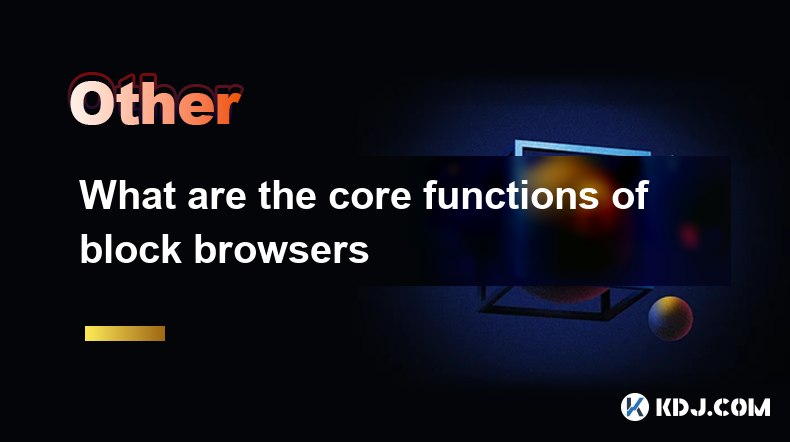
?
Block explorers, also known as blockchain explorers, are crucial tools for anyone interacting with a cryptocurrency network. They provide a window into the inner workings of the blockchain, offering a wealth of information otherwise inaccessible. Understanding their core functions is key to navigating the cryptocurrency landscape effectively.
Exploring the Core Functionality of Block Explorers
Block explorers serve several vital functions, allowing users to examine and verify transactions, analyze network activity, and gain valuable insights into the blockchain's health and security. Their capabilities are essential for both technical users and casual investors.
One primary function is transaction tracking. Users can input a transaction hash (a unique identifier) to view detailed information about that transaction, including the sender, recipient, amount, and timestamp. This allows for verification of successful transfers and troubleshooting any potential issues. This is crucial for confirming payments and resolving disputes.
Another key function is address exploration. By inputing a cryptocurrency address, users can view all transactions associated with that specific address. This provides a complete history of the address's activity, including incoming and outgoing funds. This is vital for security audits and understanding the flow of funds.
Block explorers also provide block information. Each block in a blockchain contains a set of validated transactions. Block explorers allow users to view the contents of individual blocks, including the block height, timestamp, hash, and the transactions included within. This is useful for analyzing network performance and identifying potential anomalies.
Furthermore, block explorers offer network statistics. They display various metrics related to the health and performance of the blockchain network, such as the current block height, hash rate, difficulty, and transaction fees. This provides insights into the overall network activity and its capacity.
Beyond these core functions, many block explorers offer advanced features. These can include:
- Rich list: Showing the addresses with the largest balances on the network.
- Transaction visualization: Graphically representing the flow of funds between addresses.
- API access: Allowing developers to integrate blockchain data into their applications.
- Mining pool statistics: Providing information about the activity of various mining pools.
- Unspent transaction output (UTXO) explorer: For UTXO-based cryptocurrencies like Bitcoin, this shows available funds.
The specific features offered by a block explorer will vary depending on the cryptocurrency it supports. However, the core functions of transaction tracking, address exploration, block information, and network statistics remain consistent across most platforms.
Understanding the Importance of Block Explorers in Cryptocurrency
The transparency provided by block explorers is a cornerstone of many cryptocurrencies' decentralized nature. They enable users to independently verify the integrity of the blockchain and ensure that transactions are processed correctly. This open and auditable nature is a crucial aspect of building trust and security within the cryptocurrency ecosystem. Without block explorers, verifying transactions and understanding network activity would be significantly more challenging, if not impossible for the average user.
Security Implications: The ability to track transactions and addresses is crucial for security. Users can monitor their own wallets for unauthorized activity and identify potential scams or fraudulent transactions. Block explorers play a vital role in enhancing the security and transparency of cryptocurrency transactions.
Investigative Capabilities: Block explorers are valuable tools for investigators. They can be used to trace the flow of funds in criminal investigations, helping to identify perpetrators and recover stolen assets. This is particularly important in the context of cryptocurrency-related crimes.
Market Analysis: The network statistics and rich list provided by block explorers can be used for market analysis. Understanding the distribution of coins and the overall network activity can provide valuable insights into market trends and potential investment opportunities.
Frequently Asked Questions
Q: Are all block explorers the same?
A: No, block explorers vary in their features and the cryptocurrencies they support. Some are specialized for specific blockchains, while others support multiple networks. The level of detail and advanced features also differ.
Q: How secure are block explorers?
A: Block explorers themselves do not hold your private keys. However, it's crucial to use reputable and well-established block explorers to minimize the risk of encountering malicious websites that might attempt phishing or other attacks.
Q: Can I use a block explorer to recover lost funds?
A: While a block explorer can show the transaction history of an address, it cannot directly help you recover lost funds. If you lose access to your private keys, recovery depends on the specific cryptocurrency and its recovery mechanisms.
Q: Are block explorers only for technical users?
A: While some advanced features require technical knowledge, the basic functions of transaction tracking and address exploration are accessible to anyone. Even casual users can benefit from understanding how block explorers work.
Q: How often is data updated on a block explorer?
A: The update frequency varies depending on the specific block explorer and the cryptocurrency network. However, most reputable explorers provide near real-time updates, reflecting the latest blockchain activity.
Q: What is the difference between a block explorer and a wallet?
A: A block explorer is a tool for viewing blockchain data, while a wallet is used to store and manage your cryptocurrencies. They are distinct but complementary tools; a wallet interacts with the blockchain, and a block explorer allows you to see the results of those interactions.
Disclaimer:info@kdj.com
The information provided is not trading advice. kdj.com does not assume any responsibility for any investments made based on the information provided in this article. Cryptocurrencies are highly volatile and it is highly recommended that you invest with caution after thorough research!
If you believe that the content used on this website infringes your copyright, please contact us immediately (info@kdj.com) and we will delete it promptly.
- Bitcoin (BTC) Price Prediction: Will BTC Break Out Above $86,000 to Signal the Start of a Recovery?
- 2025-04-03 07:05:12
- Recent market activity shows a split in altcoin performance.
- 2025-04-03 07:05:12
- Publicly Traded Businesses Continuously Buying Bitcoin ($BTC) to Demonstrate Its Emerging Significance
- 2025-04-03 07:00:14
- Credefi Launches Its NFT Bonds Product on the Polytrade Marketplace
- 2025-04-03 07:00:14
- What If the Next Big Crypto Boom Isn't in Bitcoin or Ethereum—but in Meme Coins?
- 2025-04-03 06:55:13
- Despite Price Drop, Shibarium Network Processes Over 1 Billion Transactions
- 2025-04-03 06:55:13
Related knowledge

What are the future development trends of blockchain game development?
Apr 03,2025 at 05:00am
Blockchain technology has revolutionized various industries, and gaming is no exception. As we look to the future, several trends are set to shape the development of blockchain games. These trends not only promise to enhance the gaming experience but also to integrate blockchain technology more seamlessly into the gaming ecosystem. Let's explore these t...
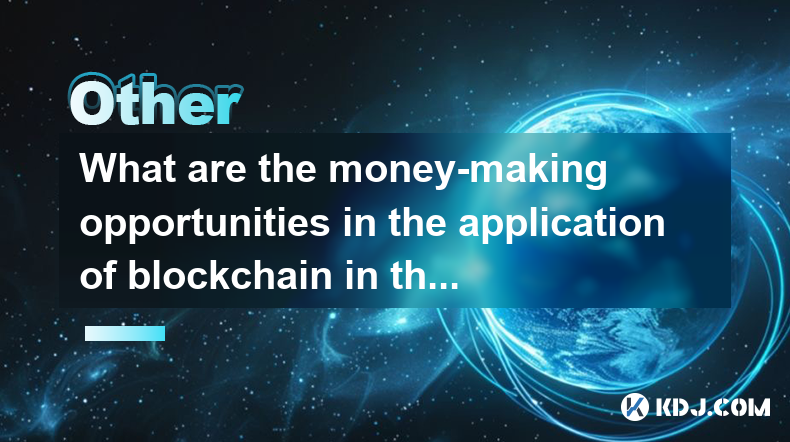
What are the money-making opportunities in the application of blockchain in the medical industry?
Apr 03,2025 at 03:35am
The integration of blockchain technology into the medical industry presents a myriad of money-making opportunities that can revolutionize healthcare systems. Blockchain's inherent characteristics, such as transparency, security, and immutability, make it an ideal solution for various medical applications. By leveraging blockchain, companies can develop ...
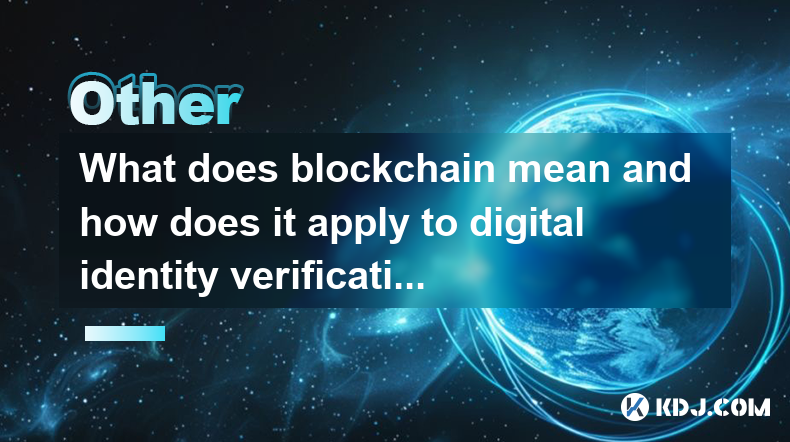
What does blockchain mean and how does it apply to digital identity verification?
Apr 03,2025 at 02:21am
Blockchain technology, at its core, is a decentralized and distributed digital ledger used to record transactions across numerous computers. This ensures that the recorded data cannot be altered retroactively without the alteration of all subsequent blocks and the consensus of the network. The concept of blockchain was initially devised for the digital ...
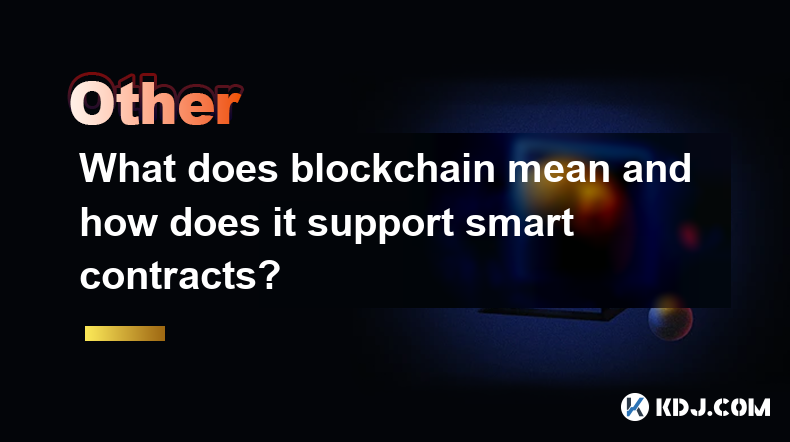
What does blockchain mean and how does it support smart contracts?
Apr 03,2025 at 02:28am
Blockchain technology is a decentralized, distributed ledger that records transactions across numerous computers. It ensures that once data is recorded, it cannot be altered retroactively without the alteration of all subsequent blocks and the consensus of the network. This technology is the backbone of cryptocurrencies like Bitcoin and Ethereum. Blockc...
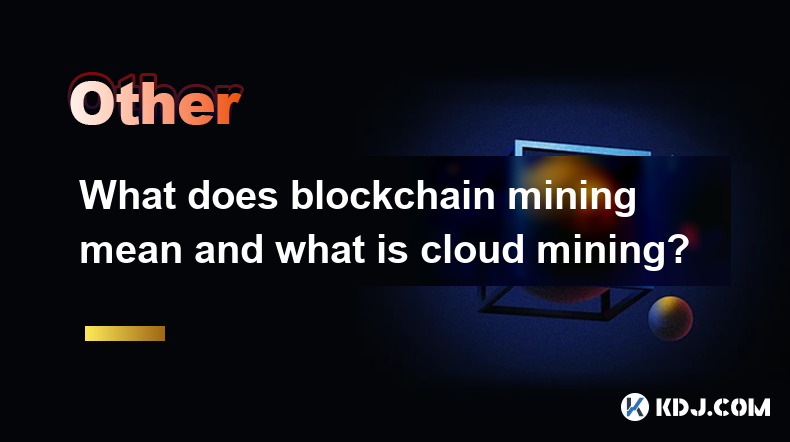
What does blockchain mining mean and what is cloud mining?
Apr 03,2025 at 02:01am
Blockchain mining is the process by which new transactions are verified and added to the blockchain ledger. It involves solving complex mathematical problems using computational power, which results in the creation of new cryptocurrency units as a reward. Miners compete to solve these problems, and the first one to find the solution gets to add a new bl...
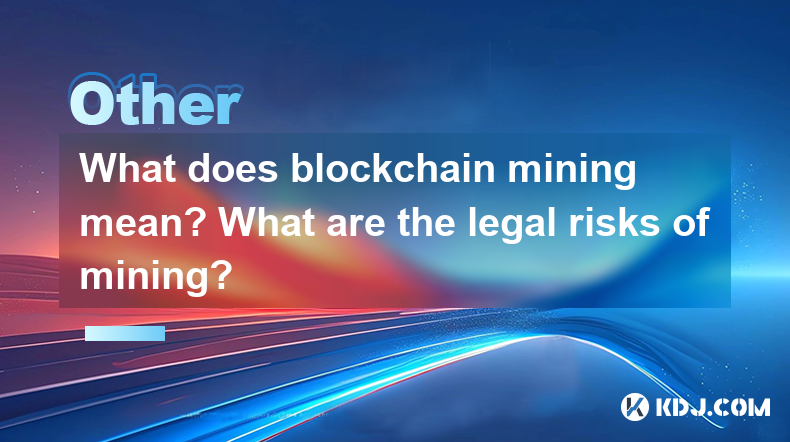
What does blockchain mining mean? What are the legal risks of mining?
Mar 31,2025 at 05:07pm
Blockchain mining is the process by which transactions are verified and added to the public ledger, known as the blockchain. Miners use powerful computers to solve complex mathematical problems, which, once solved, allow them to add a block of transactions to the blockchain. In return, miners are rewarded with cryptocurrency, typically Bitcoin. This pro...

What are the future development trends of blockchain game development?
Apr 03,2025 at 05:00am
Blockchain technology has revolutionized various industries, and gaming is no exception. As we look to the future, several trends are set to shape the development of blockchain games. These trends not only promise to enhance the gaming experience but also to integrate blockchain technology more seamlessly into the gaming ecosystem. Let's explore these t...

What are the money-making opportunities in the application of blockchain in the medical industry?
Apr 03,2025 at 03:35am
The integration of blockchain technology into the medical industry presents a myriad of money-making opportunities that can revolutionize healthcare systems. Blockchain's inherent characteristics, such as transparency, security, and immutability, make it an ideal solution for various medical applications. By leveraging blockchain, companies can develop ...

What does blockchain mean and how does it apply to digital identity verification?
Apr 03,2025 at 02:21am
Blockchain technology, at its core, is a decentralized and distributed digital ledger used to record transactions across numerous computers. This ensures that the recorded data cannot be altered retroactively without the alteration of all subsequent blocks and the consensus of the network. The concept of blockchain was initially devised for the digital ...

What does blockchain mean and how does it support smart contracts?
Apr 03,2025 at 02:28am
Blockchain technology is a decentralized, distributed ledger that records transactions across numerous computers. It ensures that once data is recorded, it cannot be altered retroactively without the alteration of all subsequent blocks and the consensus of the network. This technology is the backbone of cryptocurrencies like Bitcoin and Ethereum. Blockc...

What does blockchain mining mean and what is cloud mining?
Apr 03,2025 at 02:01am
Blockchain mining is the process by which new transactions are verified and added to the blockchain ledger. It involves solving complex mathematical problems using computational power, which results in the creation of new cryptocurrency units as a reward. Miners compete to solve these problems, and the first one to find the solution gets to add a new bl...

What does blockchain mining mean? What are the legal risks of mining?
Mar 31,2025 at 05:07pm
Blockchain mining is the process by which transactions are verified and added to the public ledger, known as the blockchain. Miners use powerful computers to solve complex mathematical problems, which, once solved, allow them to add a block of transactions to the blockchain. In return, miners are rewarded with cryptocurrency, typically Bitcoin. This pro...
See all articles
























































































